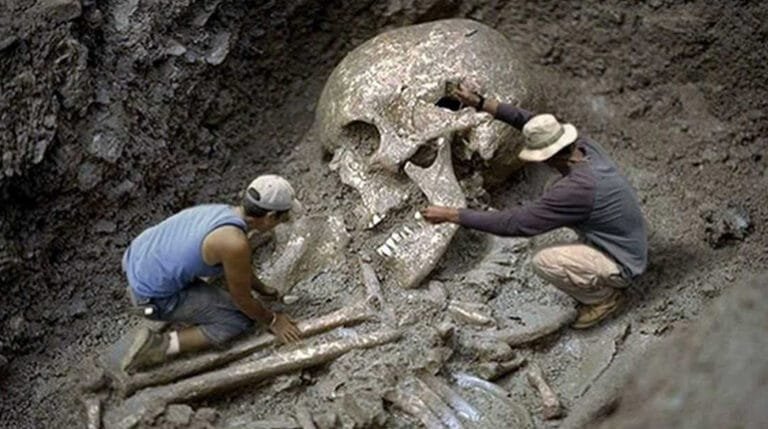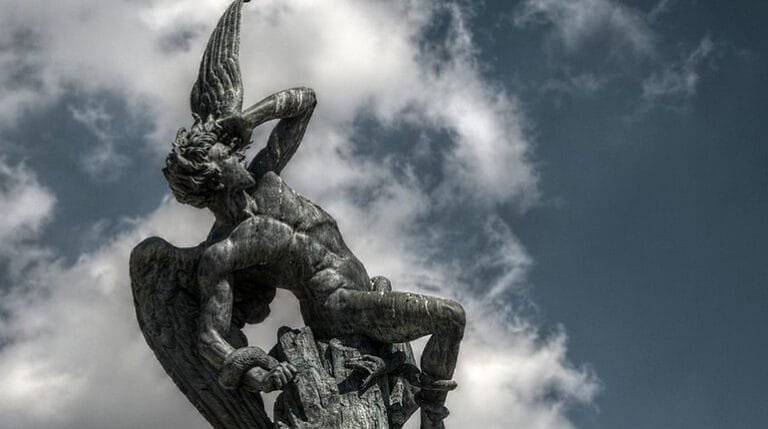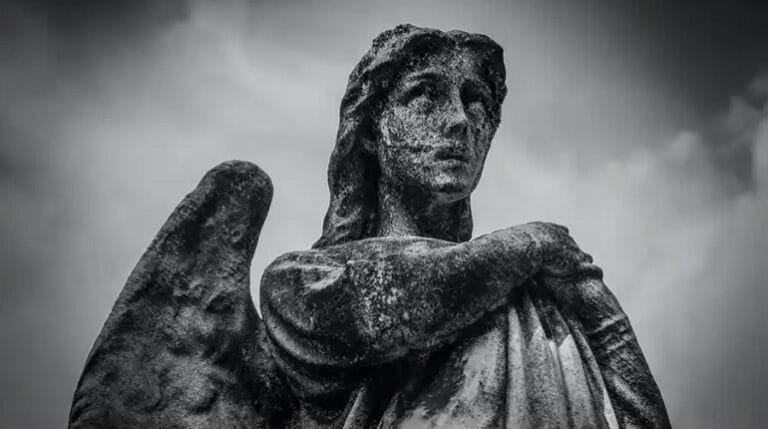The Divine Judgment Against Nephilim DNA

The biblical narrative in Genesis provides a compelling and enigmatic glimpse into the spiritual, moral, and genetic decline of humanity leading up to the great flood. Particularly significant is the passage in Genesis 6:1-4, which describes the intermingling of fallen angels with human women, producing a hybrid race known as the Nephilim. This unusual union between celestial beings and humans raises profound questions about the implications for humanity’s genetic code and God’s subsequent response. As we delve deeper into this narrative, we must confront the question of divine judgment against the corruption of human DNA that these forbidden unions created.
According to Genesis 6:13, God declares, “The end of all flesh has come before Me,” indicating His discontent with the state of humanity. The implication is clear: the human genetic code was corrupted through these unnatural unions, leading God to take drastic measures to restore purity to His creation. Only Noah and his family retained the untainted genetic lineage necessary to fulfill God’s covenant and repopulate the earth after the flood. Exploring this theme obtains profound importance in understanding not just the story of Noah’s Ark but also in addressing the overarching issues of morality, genetics, and divine judgment that permeate the biblical account. The ensuing discussion seeks to unpack the layers of mystery surrounding the Nephilim, the corruption of human DNA, and the ultimate consequences in God’s divine plan for humanity.
The Nephilim: A Breach of Divine Order
The story of the Nephilim begins in the early chapters of Genesis where we find a complex narrative involving beings that straddle the line between divine and human realms. Genesis 6:1-4 describes sons of God—widely interpreted as fallen angels—taking human wives, leading to the birth of giants known as the Nephilim. These beings were not merely physical manifestations; they were symbolic of a gross breach in the divine order established by God when creating distinctly human and divine realms.
This act of breeding transcended mere lust and deviated from God’s design. It represented an assault on the very fabric of creation, where angels acted outside their intended purpose and humans were seduced into disobedience. The Nephilim embodied the results of this corruption; they were a physical and spiritual manifestation of mankind’s departure from God. The term Nephilim itself has been subject to various interpretations, but it commonly translates to “fallen ones,” emphasizing their disconnection from God’s original plan.
The Nature of Fallen Angels
Understanding the nature of these fallen angels is crucial for grasping the gravity of their actions. According to Christian theology, these beings once occupied a high station in heaven but succumbed to pride and rebellion, leading to their expulsion. They are often associated with the adversary of creation, as they seek to undermine God’s authority and purpose. The act of interbreeding with humanity represents their continued rebellion against God and the establishment of chaos within the heavenly order.
The Corruption of the Human Genetic Code
The narrative in Genesis leads us to consider a troubling reality—that the human genetic code became corrupted through the union of these fallen angels with human women. This idea raises the implication that God, in response to moral degradation and corruption, saw it fit to cleanse the earth through cataclysmic judgment.
Genesis 6:12 states that “all flesh had corrupted their way upon the earth.” The phrase “corrupted their way” suggests that the very essence of humanity was fundamentally tainted. This included not only moral and ethical decay but also the genetic integrity of humankind. The Nephilim, viewed as a hybrid offspring, served as a clear indication that the divine lines were blurred, necessitating God’s intervention.
The Implications of Genetic Corruption
The ramifications of this genetic corruption extend beyond the immediate narrative, touching upon themes of identity, purity, and the divine design. The Nephilim existence may suggest an erosion of what it truly means to be made in the image of God—a thought-provoking issue especially in contemporary discussions surrounding genetic manipulation and cloning.
The implications lead to profound theological and ethical questions, such as:
- What does it mean to be created in God’s image?
- How does one discern between divinely intended and human-manipulated forms of life?
- Can certain actions lead to spiritual or genetic corruption?
These enduring questions find their roots in the events outlined in Genesis, suggesting a long-lasting conflict between divine order and human disobedience that remains relevant to our modern moral landscape.
God’s Divine Judgement
In the face of this widespread corruption, God’s judgment came in the form of the Great Flood. Genesis 6:13 states, “And God said unto Noah, The end of all flesh is come before me; for the earth is filled with violence through them.” The declaration that “the end of all flesh” was upon the world provides a stark warning of the consequences of deviating from God’s design. God’s actions were not arbitrary but intended to restore order and purity to His creation.
The flood served as a purification process, a means to eliminate the Nephilim and their corrupting influence from the earth. It underscores the seriousness with which God regards the integrity of His creation. The flood narrative highlights a divine commitment to justice against moral decay and genetic infringement, emphasizing that God will intervene when His creation strays too far from its intended purpose.
Noah: The Last Beacon of Purity
Noah emerges as the singular figure chosen by God to preserve purity amidst corruption. The scripture states that Noah was “a righteous man, blameless in his time” (Genesis 6:9). This suggests that Noah not only maintained his ethical standing but also possessed a genetic lineage untainted by Nephilim DNA. The purity of Noah’s genetic line made him and his family the only candidates worthy of restarting humanity post-flood.
This selection serves a dual purpose: it is both a physical salvation for a pure line and a spiritual beacon that reflects God’s commitment to redeeming creation. By opting for Noah and his family, God reestablishes a point of reference for moral and genetic integrity, suggesting that the necessity for purity remains relevant even today.
Lessons for Today
The narrative of the Nephilim, divine judgment, and the purity of Noah’s lineage offers critical lessons that extend well beyond the pages of Genesis. Today’s society grapples with issues surrounding genetic manipulation, cloning, and other forms of biotechnology that challenge the traditional understanding of being created in the image of God. The Nephilim story serves as a lens through which we can scrutinize our ethical boundaries and the implications of tampering with the divine order.
In a world where the integrity of creation has been compromised through various means, the call for discernment grows stronger. Current advancements in genetic engineering prompt pressing questions about the future of humanity:
- What are the ethical implications of designing human life according to specific traits?
- How do we ensure that we do not lose our humanity while striving for improvement?
- What safeguards can be put in place to prevent a return to the corruptions represented by the Nephilim?
By drawing on the lessons from the biblical account, we become more equipped to navigate these complexities with moral clarity and divine intention, ensuring that we learn from humanity’s past and pursue a path that honors God’s original design.
Conclusion
In retracing the steps of humanity from the days of the Nephilim to the divine judgment that followed, we uncover rich theological, ethical, and moral insights pertinent to our contemporary discourse. The corruption of human DNA through inappropriate unions signifies a broader truth about maintaining the integrity of God’s creation. The flood serves as a powerful reminder of God’s commitment to justice and order, highlighting the necessity for purity—not only in a genetic sense but in spiritual and moral dimensions as well.
As we reflect on these themes, we must remain vigilant in our pursuit of ethical integrity and God-honoring practices in our modern world. The ongoing dialogue surrounding genetics underscores the need for moderation and discernment as we strive to navigate the treacherous waters of human innovation. Just as God reestablished purity through Noah, may we endeavor to embrace the principles of divine design in our current technological landscape, safeguarding humanity’s future in alignment with God’s original purpose.






